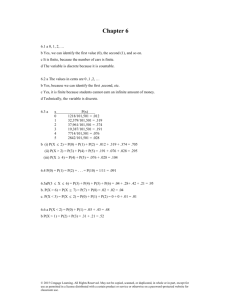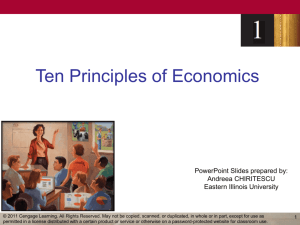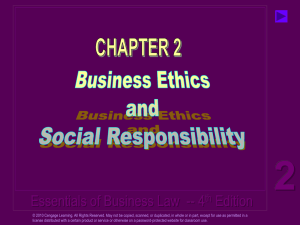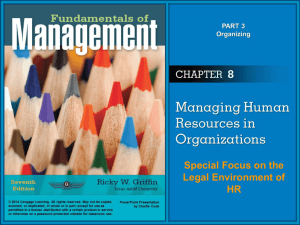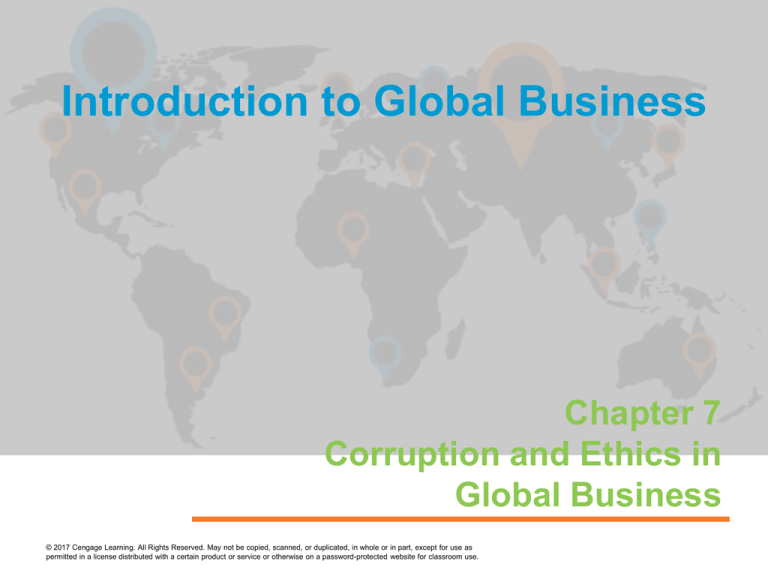
Introduction to Global Business
Chapter 7
Corruption and Ethics in
Global Business
© 2017 Cengage Learning. All Rights Reserved. May not be copied, scanned, or duplicated, in whole or in part, except for use as
permitted in a license distributed with a certain product or service or otherwise on a password-protected website for classroom use.
After studying this chapter, you should be able to:
1. Explain briefly the meaning of ethics.
2. Describe how ethics and economic progress are
connected.
3. Describe briefly the function of corporate social
responsibility (CSR).
4. Recount the events in some of the more famous
corporate financial scandals.
5. Explain how ethics can be taught.
6. Explain how internal controls can facilitate ethical
behavior and help prevent financial impropriety.
© 2017 Cengage Learning. All Rights Reserved. May not be copied, scanned, or duplicated, in whole or in part, except for use as
permitted in a license distributed with a certain product or service or otherwise on a password-protected website for classroom use.
Philosophical Principles of Ethics
Imperative
Principle
• Do what is right.
Generalization
Argument
• Do what is right,
but filter action by
considering
consequences.
© 2017 Cengage Learning. All Rights Reserved. May not be copied, scanned, or duplicated, in whole or in part, except for use as
permitted in a license distributed with a certain product or service or otherwise on a password-protected website for classroom use.
Utilitarian
Principle
• Do what
produces the
greatest good.
What Is Ethics?
• Ethics
– The branch of philosophy that addresses the values pertaining to
human behavior, with regard to the “rightness” and “wrongness” of
actions and to the “goodness” and “badness” of the intent and
results of such actions
• Integrity
– Adherence to moral and ethical principles; soundness of moral
character; honesty. As a practical matter, a person of integrity
knows what is right and has the courage to do it.
© 2017 Cengage Learning. All Rights Reserved. May not be copied, scanned, or duplicated, in whole or in part, except for use as
permitted in a license distributed with a certain product or service or otherwise on a password-protected website for classroom use.
EXHIBIT 7.1 BASIC STEPS IN ETHICAL DECISION MAKING
1. Define all the facts and circumstances, including who, what, where, when,
and how.
2. Identify the people affected by the situation and their rights and obligations.
3. Identify the alternative decisions and consequences.
4. Make the decision: determine the right thing to do and then do it.
© 2017 Cengage Learning. All Rights Reserved. May not be copied, scanned, or duplicated, in whole or in part, except for use as
permitted in a license distributed with a certain product or service or otherwise on a password-protected website for classroom use.
Ethics in Business and Society
• For ethical business activity to occur, mutual trust, fair
dealings, and honest communication are essential.
• Ethics and economics
– Unethical behavior (e.g., inside information) destroys fair
investment markets.
– Commonly-shared positive ethical values regarding respect for
individuals, their lives, their property, and their freedoms promote
individual integrity and doing the “right thing.”
• Corruption Perceptions Index (CPI) is published each
year by Transparency International, providing metrics to
the potential corruption risk for most of the world’s
countries.
© 2017 Cengage Learning. All Rights Reserved. May not be copied, scanned, or duplicated, in whole or in part, except for use as
permitted in a license distributed with a certain product or service or otherwise on a password-protected website for classroom use.
What Is Corporate Social Responsibility?
• Corporate social responsibility (CSR)
– A company’s obligations to society, including the welfare of people
and places affected by company activities
• CSR mandates that a company should try to:
– Provide quality products or services
– Provide an appropriate return on investment to the company’s
stockholders
– Treat its employees with dignity and respect
– Take care of the environment
– Meet its legal obligations
– Deal fairly with suppliers, lenders, and other business parties
© 2017 Cengage Learning. All Rights Reserved. May not be copied, scanned, or duplicated, in whole or in part, except for use as
permitted in a license distributed with a certain product or service or otherwise on a password-protected website for classroom use.
Rules, Policies, and Guidelines
• Making an ethical choice:
– Follow legal rules
– Apply the formal ethical policies of your organization
– Use your moral intuition to answer the following:
• What would your mother or father say if you acted in that way?
• How would you feel if you saw your situation described in the
newspaper?
• Does the situation “smell” bad?
• Would you use your behavior as a marketing tool?
© 2017 Cengage Learning. All Rights Reserved. May not be copied, scanned, or duplicated, in whole or in part, except for use as
permitted in a license distributed with a certain product or service or otherwise on a password-protected website for classroom use.
Rules, Policies, and Guidelines (continued)
• Two principles that can help you make an ethical
decision:
– The principle of consistency—considering what would be the
consequences if everyone made the same choice that you are
about to make
– The principle of respect—choosing the alternative that treats
people with the greatest respect
© 2017 Cengage Learning. All Rights Reserved. May not be copied, scanned, or duplicated, in whole or in part, except for use as
permitted in a license distributed with a certain product or service or otherwise on a password-protected website for classroom use.
Financial Scandals: Enron
• Enron Corporation
– Was a major global provider of electricity, natural gas, pulp and
paper, and communications services
– Used innovative and misleading accounting in “cooking its books”
to avoid disclosing unprofitable operations, including mark to
market accounting practices
• The Enron scandal was a key event leading the U.S.
Congress to pass a new federal securities law for
financial accounting and reporting transparency, the
Sarbanes–Oxley Act of 2002, often referred to as SOX.
© 2017 Cengage Learning. All Rights Reserved. May not be copied, scanned, or duplicated, in whole or in part, except for use as
permitted in a license distributed with a certain product or service or otherwise on a password-protected website for classroom use.
Financial Scandals: WorldCom
• WorldCom
– Used fraudulent accounting methods to manipulate earnings to
present a false image of growth and prosperity to prop up the firm’s
stock price
– Underreported “line costs” as assets rather than expensing them
and fraudulently overstated revenues
• Internal auditors eventually discovered the fraud and the
firm filed for bankruptcy protection which wiped out the
investments of stock and bond holders.
© 2017 Cengage Learning. All Rights Reserved. May not be copied, scanned, or duplicated, in whole or in part, except for use as
permitted in a license distributed with a certain product or service or otherwise on a password-protected website for classroom use.
Financial Scandals: Vivendi
• Vivendi
– Was a French-based multinational corporation with operations in
music, television and film, publishing, telecommunications, the
Internet, and video games
– Used fraudulent accounting methods for several years to hide cash
flow, liquidity, and financial obligation problems to boost its
apparent financial performance to enhance its stock price and
make several acquisitions
• The fraud was discovered by the company’s board of
directors.
– The CEO was required to resign and pay a fine of $1 million.
– Vivendi further paid a fine of $50 million.
© 2017 Cengage Learning. All Rights Reserved. May not be copied, scanned, or duplicated, in whole or in part, except for use as
permitted in a license distributed with a certain product or service or otherwise on a password-protected website for classroom use.
Financial Scandals: Parmalat
• Parmalat
– An Italian-based multinational corporation specializing in dairy and
food products
– Used risky derivatives and purchase of its own debt to disguise
losses in several of its new international acquisitions
– Was placed under control of a commissioner by the Italian
government after the firm collapsed into bankruptcy when it could
not pay of its debt and make its bond payments
© 2017 Cengage Learning. All Rights Reserved. May not be copied, scanned, or duplicated, in whole or in part, except for use as
permitted in a license distributed with a certain product or service or otherwise on a password-protected website for classroom use.
Other Financial Scandals
• Other significant financial scandals include:
– Teapot Dome scandal
• Resulted from the secret leasing of Teapot Dome oil reserves to a
businessman who paid Secretary of the Interior Albert Fall hundreds of
thousands of dollars in zero-interest loans
– Ponzi scheme
• A fraud in which money received from later investors is used to provide
returns to earlier investors, thus giving an appearance of a profitable
investment
• First perpetrated by Charles Ponzi during the 1920s
© 2017 Cengage Learning. All Rights Reserved. May not be copied, scanned, or duplicated, in whole or in part, except for use as
permitted in a license distributed with a certain product or service or otherwise on a password-protected website for classroom use.
Can Ethics Be Taught?
Personal
integrity
Corporate
governance
Fundamentals
of Ethics
Education:
Ethical
leadership
© 2017 Cengage Learning. All Rights Reserved. May not be copied, scanned, or duplicated, in whole or in part, except for use as
permitted in a license distributed with a certain product or service or otherwise on a password-protected website for classroom use.
Responsibility
of business in
society
Ethical
decisionmaking
Internal Controls
• Internal controls
– A system of rules and procedures designed to ensure the accuracy
and reliability of financial and accounting information
• Internal control procedures
– Preventing accidental errors and irregularities (intentional
misrepresentations)
– Identifying errors and irregularities for corrective action
© 2017 Cengage Learning. All Rights Reserved. May not be copied, scanned, or duplicated, in whole or in part, except for use as
permitted in a license distributed with a certain product or service or otherwise on a password-protected website for classroom use.
Foreign Corrupt Practices Act
• Foreign Corrupt Practices Act (FCPA) of 1997
– Applies to U.S. firms and to foreign firms that engage in business
in the United States
– Consists of two parts:
• An anti-bribery provision
• A requirement to maintain an adequate internal control system over
financial books and records
© 2017 Cengage Learning. All Rights Reserved. May not be copied, scanned, or duplicated, in whole or in part, except for use as
permitted in a license distributed with a certain product or service or otherwise on a password-protected website for classroom use.
Foreign Corrupt Practices Act (continued)
• Corporate financial scandals of the early 2000s have led
to new regulatory measures, including
– Sarbanes–Oxley Act (“SOX”) of 2002
• Increased the prison sentence for fraud to 25 years
• Established 20-year sentences for destroying, altering, or fabricating
records in federal investigations, or any scheme to defraud shareholders
• Requires that the chief executive officer and chief financial officer of a
publicly traded corporation must certify that its financial statements
accurately present the firm’s financial condition and results of the firm’s
operations
© 2017 Cengage Learning. All Rights Reserved. May not be copied, scanned, or duplicated, in whole or in part, except for use as
permitted in a license distributed with a certain product or service or otherwise on a password-protected website for classroom use.
Computer Security of Accounting Information
• Basic threats to computer security
–
–
–
–
–
Natural disasters
Dishonest employees
Disgruntled employees
Persons external to the organization
Accidental errors and omissions
© 2017 Cengage Learning. All Rights Reserved. May not be copied, scanned, or duplicated, in whole or in part, except for use as
permitted in a license distributed with a certain product or service or otherwise on a password-protected website for classroom use.
Key Terms
ethics
integrity
Corruption Perceptions
Index (CPI)
corporate social
responsibility (CSR)
mark to market accounting
Ponzi scheme
internal controls
Foreign Corrupt Practices
Act (FCPA)
© 2017 Cengage Learning. All Rights Reserved. May not be copied, scanned, or duplicated, in whole or in part, except for use as
permitted in a license distributed with a certain product or service or otherwise on a password-protected website for classroom use.


